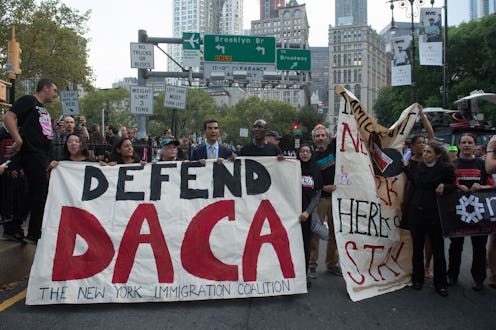News
Why Ending DACA Puts All Latinx Americans In Danger

The Trump administration confirmed Tuesday that it is ending the Deferred Action for Childhood Arrivals program, which grants legal status to some immigrants who arrived in the United States as children. This program won't end in a vacuum however, and there will be consequences far beyond the immediate impact. Ending DACA endangers all Latinx Americans, and the entire community needs support while the federal government legislates this matter.
Obviously the people most at risk by ending DACA are the 800,000 Americans who are enrolled in it. Now that the program is ending, Dreamers could lose their drivers licenses, jobs, ability to go to school, and protection against deportation. The United States is the only country they've ever really known, yet they may be kicked out for no other reason than their immigration status.
Dreamers are the most in need of advocacy and protection right now, but people might not realize how ending this program hurts all Latinxs regardless of their immigration status. While not all DACA recipients are Latinx, the vast majority are, according to the Migration Policy Institute. Additionally, the public on both sides of the political spectrum generally conceives of Dreamers as Latinx. That places all Latinx Americans in danger, because it conflates Latinx with "illegal," un-American, and unwelcome. It's already somewhat common to see news stories of bigots harassing Latinxs in public on the assumed basis of their immigration status — ending DACA gives them additional reinforcement of their worldview and tacitly endorses their behavior.
The focus on DACA also establishes a frame for the American people to think of Latinxs in reference to their immigration status, rather than respecting the full breadth of the Latinx community. Latinxs are not a monolithic group — the demographic is made up of hundreds of ethnicities and unique cultures. Furthermore, when the community needs to spend all of its energy focusing on immigration, Latinxs are denied important and necessary opportunities to talk about other issues such as sexism, colorism, homophobia, and socioeconomic disparities.
Killing the program also denies Latinxs the opportunity to support themselves in multiple ways. Dreamers contribute $460 billion to the American economy, which now won't go to Latinx families and communities. It discourages political participation and forces Latinxs to live in a culture of silence, in which people feel they can't report crimes or use public services without risk of losing their homes and their families. Ending DACA reduces the visibility of all Latinxs at a time when representation is more important than ever.
Put together, this is psychologically damaging for Latinxs of all backgrounds. Speaking from personal experience, it feels less safe now to walk around as a visibly Latinx person, even though I'm a citizen who was born in this country. While non-Dreamer Latinxs are not in any more systemic danger than before Trump's decision, there's no guarantee that law enforcement or private citizens won't choose to deny me my rights based on my skin color, as has happened to so many of my fellow Latinxs. DACA ending has given people one more reason to target me and other Latinxs, and that vulnerability can feel as real and literal as a physical brand on your skin.
So what can allies do to help? Start by going over your Latinx education. Take the time to be fully informed about DACA and who's immediately effected. Think critically about the wider repercussions of ending the program and how it might be the start of a slippery slope for Latinx discrimination in the United States. Then look into other issues affecting the Latinx community, such as health disparities, domestic violence, and income inequality. Before you start interacting with these communities, it's crucial to understand the intersectional problems they face.
Next, connect with your immediate network. Reach out to any Latinxs and ask them how they are doing — be prepared to listen. This is a stressful and emotional time, and you may need to be a vent for a Latinx friend or loved one's frustration and fear. If you don't know any Latinxs, see how you can provide resources to Latinx communities in your area by reaching out to local charities.
Finally, take your efforts to the next level by protesting, donating, and volunteering. Every dollar and sign makes a difference, and there are tons of great ways you can support Dreamers. The American people should get to define who gets to stay in this country, and if everyone rallies around Dreamers, the power of the people may be able to protect them from possible deportation.